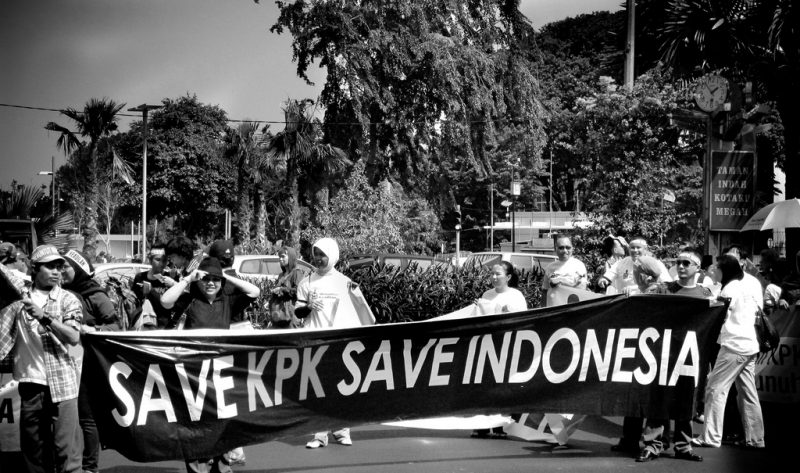The Corruption Eradication Commission (KPK) remains one of the most supported and trusted public institutions in Indonesia, but not everyone is a fan. Long-running disputes with the National Police as well as members of the House of Representatives often heightens support among the public for the body. The Indonesian Corruption Watch (ICW), which monitors corruption and public responses across the country, has often warned of official attempts to undermine the KPK mandate.
Here is a brief history of attacks on the KPK, according to ICW.
Knocking Back Budget Requests
In 2008, the Parliament refused to provide the budget for a new Commission of Corruption Eradication (KPK) building. The KPK maintained the organisation had outgrown the then-current building and it was impeding on work.
The rejection of funding saw the development of the ‘Saweran for Commission of Corruption Eradication’ movement in support of the popular anti-corruption body. A request for funding for the establishment of five regional-based KPK representatives was also rejected.
Advocating Dissolution Of The Body
Consultation meetings held in 2011 between Parliamentary representatives, police, the Attorney General and KPK moved to dissolve the institution.
Prosperous Justice Party (PKS) parliamentarian Fahri Hamzah courted controversy after saying the KPK had been doing a poor job in addressing corruption issues.
Naming The KPK An ‘Ad Hoc’ Institution
Parliament spokesman Marzuki Alie declared the KPK an ad hoc institution in 2011, meaning public prosecutors and police are considered effective in combating corruption rendering KPK unnecessary.
Using Legislation To Weaken Body
ICW noted several political parties in the House of Representatives have proposed revisions to the Commission of Corruption Eradication Law from 2011 onwards.
Many of these proposals would see the KPK wholly delegitimised, including through restricting the recruitment of independent investigators, obtaining permission for wiretaps and limiting the KPK to just 12 years before dissolution.
A revision to Criminal Code saw some attempts to add corruption offenses to the draft, which, if passed, would mean corruption is no longer considered an extraordinary crime.
See: Indonesian Legal Aid Foundation: Justice Rights Is Just Parliament’s Excuse to Disarm KPK
Intervening In Investigations
KPK then-Deputy Chairman Mochammad Jasin in 2011 acknowledged members of the parliament often intervene with corruption cases, usually through phone calls or hearings.
Delaying Selection Process For Leadership Posts
The House of Representatives postponed the election of two KPK leadership candidates until mid-January 2015, leaving the body without robust leadership for over a month.
Both candidates underwent the fit and proper test from the House’s Commission III, which oversees legal affairs, to replace outgoing Deputy Chairman Busyro Muqoddas in December 2014.
By the end of 2015, the Commission III had also rejected eight proposed KPK commissioners on the grounds all candidates had failed basic requirements.
Protecting Political Elite
Golkar Chairman and Speaker of the House Setya Novanto has twice appeared in statements provided by suspects in corruption cases, prompting the KPK to set a ‘prevent’ status for the elite politician. This move was rejected by the Parliament, with some members sending a letter of objection to President Joko Widodo.
Threatening The Right Of Inquiry
ICW assessed the formation of a committee regarding the right to inquiry for the KPK has led to the weakening or even dissolution of the Commission. The formation of the committee is based on political motives and procedural defects while running contrary to the law, ICW found.




